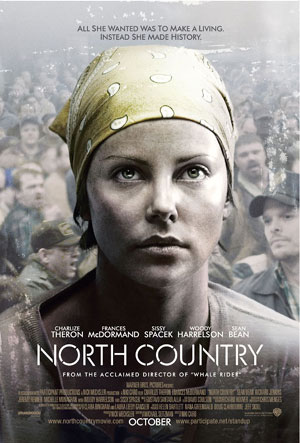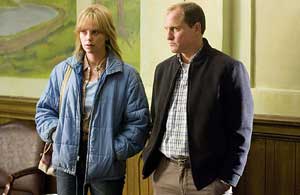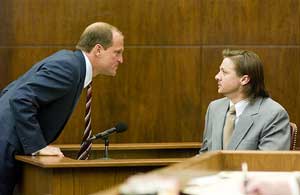 Woody Harrelson’s an interesting guy to interview. He’s distracted easily. Listening to the tape of this round table, the guy more than once broke off an answer to play with tape recorders ("I get distracted by shiny things!" he said) and to find out just what the Zap2It reporter was writing.
Woody Harrelson’s an interesting guy to interview. He’s distracted easily. Listening to the tape of this round table, the guy more than once broke off an answer to play with tape recorders ("I get distracted by shiny things!" he said) and to find out just what the Zap2It reporter was writing.
In his new film, North Country, Woody plays a guy with a bit more focus. He’s a lawyer who represents Charlize Theron in her groundbreaking sexual harrassment case. He’s also an old hockey hero, and he has a number of scenes on the ice.
Q: Was the most challenging part the hockey or the lawyering?
Harrelson: Well, morally… [laughs] No, the hockey was tough. I hadn’t grown up skating, so that was my biggest challenge. I just worked on it and worked on it. When we first shot it, it was so hard for me. It was the most pressure I ever felt. I felt so much pressure because I couldn’t skate that well and I didn’t quite have the accent. My God, it was horrible.
Fortunately, for various reasons they had to reshoot that scene and so we then reshot it at the end. It still took everything I had to just stand up.
Q: Was this an easy character to relate to?
Harrelson: I related to his disillusionment, where he thought he was going for this big dream that he saw through at one point and went back home. And then started a bender, which I can relate to, of course.
Q: Have you ever gotten so disillusioned with acting that you thought of changing careers?
Harrelson: I never was disillusioned with acting because I love acting, but I felt at one point like I was on a hamster wheel. I was just doing movie after movie, I was just thinking so much about career related things and missing out on hanging with my family as much as I needed to. So I just took some time off. I was going to take two or three years and it turned into five years, but I’d certainly say it’s the best thing I ever did. Now I come back to this whole thing energized and psyched.
Q: Did perceptions of you change when you were away for so long?
Harrelson: I look at it as probably starting over from ground zero. Just trying to slowly get my way back into the game. Perception, I don’t know about all that, but I know that not having done it for so long, it’s a slow process getting into it again.
Q: With a film like this, how important is the political aspect to you?
Harrelson: I loved the story. I think it’s a powerful story. People standing up for their rights – I think it’s a great film, and very important. You can’t really separate, even though there’s an entertainment value to the film, you can’t separate the political impact of the message. It’s rare that you get a film with a political message that’s also entertaining. When you get both like this, it’s really cool.
 Q: What would you say were Niki’s strongest qualities as a filmmaker?
Q: What would you say were Niki’s strongest qualities as a filmmaker?
Harrelson: I knew she was really talented [from Whale Rider]. Of course you never know, some people make a great film and then they can’t follow up. But here she just hit it out of the park again. Niki is amazing because, and I don’t know if this is a distinction between the genders, but when she would come talk to you about what she wanted – assuming no one had played the scene wrong – when she had notes she had a way of communicating from the heart and not just the intellect. I thought it was key to look at everything from the heart. That’s what shines through in the movie, it’s from the heart.
Q: Your relationship with Charlize in the film is interesting in that it never develops into a normal love story.
Harrelson: They cut out the love scene. Just kidding!
I liked that. It’s a real fine line. This is an interesting choice from Niki: I saw it twice – the time before when I saw it there was something in it that wasn’t in it when I saw it in Toronto. It’s at the end when we’re saying goodbye to each other, there was a thing where I said, ‘Call you later?’ and she said, ‘Yeah,’ and we smiled at each other. Niki even cut that, because she thought that was too far. I thought it was an interesting choice.
There’s clearly initially some attraction, but it rises to the line but doesn’t go over.
Q: How did Scanner Darkly go?
Harrelson: It was very interesting. I read that book and I honestly have no idea what’s going on in the book. I did the movie because I just wanted to work with Rick Linklater and Keanu and Downey and Winona. I wanted to do it, but I still don’t know what the hell that film is about. I can’t tell you. But I know that it’s really interesting.
Q: It’s shot in a special way, right?
Harrelson: We shot it high def, and Rick is doing just like Waking Life and painting images on the film. It was cool shooting it because he’d have six cameras lined up everywhere.
There was a little bit of spontaneity, and of course Downey will go off. He really is genius. One time we did this scene where we’re all around in a living room talking about a bike, and he just went off on this great tirade. Rick cut and me and Winona looked at each other and she said, ‘I am so glad we got to see that.’ The guy is amazing.
Q: Have you seen any of the footage that’s been animated yet?
Harrelson: I haven’t seen it. I’ve seen images, but I do think they’ve got a lot of it animated by now.
Q: They showed some of it animated at the San Diego ComicCon. It looked amazing. They showed that bike scene.
You also have The Big White.
Harrelson: The Big White is with Robin Williams and Holly Hunter. We shot that in Alaska, in the Yukon. I think that’s a really great movie more in the style of the Coen Brothers.
Then this movie The Prizewinner of Defiance, Ohio. I hope you guys get to check that out.
Q: You’ve gone back to TV to do Will and Grace. Do you like going back and forth between that and film?
Harrelson: Back and forth? I just did like seven or eight episodes or something. I just wanted to – shit man, I love that show and I love Jimmy Burrows and that cast. It couldn’t be much better writing. I don’t necessarily want to go back and do another television series.
Q: You don’t miss waking up and knowing you have a job for a year?
Harrelson: I hate getting up in the morning and knowing I have to work for the next year. Maybe it’s from living the life of Reilly and not having too many responsibilities – that’s not true, I got some responsibilities. I got to be the guy to crack open the cocoanuts in the morning, I got all kinds of stuff you wouldn’t believe!
some responsibilities. I got to be the guy to crack open the cocoanuts in the morning, I got all kinds of stuff you wouldn’t believe!
There’s something cool about it too, in a sense. There’s something about knowing you’ll be with your family for the next seven, eight months. You do a movie and you’ll be away for three weeks.
Q: When you got to the Cheers job did you think it would lead to all this.
Harrelson: For six years during Cheers I couldn’t get another job, so I was getting into the mindset of, ‘Wow, this is it. I thought the career was just starting but I guess it’s over.’ Then fortunately I got a role in Doc Hollywood and then White Men Can’t Jump. Those I was doing my hiatus during Cheers. I did Indecent Proposal during my last hiatus on and that came out literally the day after we wrapped. Then I started work on CheersNatural Born Killers, so I was fortunately able to segue. But for a while I thought that was it and I wanted to do so much more, and that I could express myself more.
Not to say that Woody Boyd wasn’t an expressive role!
Q: Speaking of expressing yourself, you’ve always been an outspoken environmentalist. What’s some of the stuff you’re thinking about and working on? Do you think the environmental movement is in a good place?
Harrelson: I remember hearing someone say one time if environmentalists were not worried about taking credit for saving the world, we’d have saved it a long time ago. I feel there’s a real need for the environmental groups to get together. You look at the oil companies, who would be the arch-nemesis of the environmental movement – those guys, when the gas goes up half a cent at Chevron, it goes up half a cent at Shell. Every move is coordinated, they’re totally in control. That’s what needs to happen in the environmental movement, and I think it is to some degree.
All the environmental groups have to focus on one main issue together, like for example getting off the dinosaur tit. That’s the move we need to do right now, and now is the time because you have Hurricane Katrina, which is a direct by-product of global warming. Scientists twenty years ago were saying we’d have increased severity of storms and more hurricanes; we’d have more flooding, melting of the polar ice caps, etc. It’s all happening exactly the way they predicted except a little bit faster. Now is the time for all of us to get together, and I think that’s a good issue.